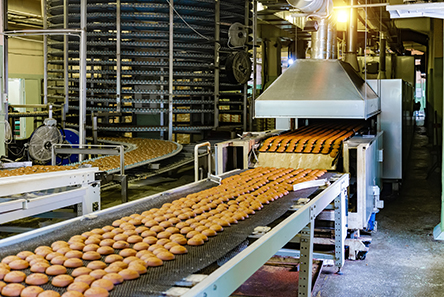
In 2018, the HSE announced that they would be focusing their attention on the food sector and in particular, flour dust by carrying out full inspections on 300 factories to check levels of airborne dust and what safety equipment and practices were in place to control the risks.
It has now been revealed by HSE that an East Yorkshire bakery company was fined after failing to protect its employees from exposure to flour dust. The fine came after an inspection carried out by the HSE found that there was no effective method of control in place to prevent the dust from becoming airborne and employees being exposed to breathing it in.
As a result of this, many employees were consistently exposed to risks to their health and some developed occupational asthma as a result. Following a hearing at Leeds Magistrates’ Court, the company pleaded guilty to breaching Section 2 (1) of the Health and Safety at Work Act 1974 and was ordered to pay a fine.
“Exposure to flour dust in an industrial setting can cause serious and debilitating health effects.â€
“Companies should be aware that HSE will not hesitate to take appropriate enforcement action against those that fall below the required standardsâ€
Geoff Fletcher HSE Inspector
What Are the Dangers of Flour Dust?
Within industrial bakeries and factories, flour is used in vast amounts to create products. In areas of the bakery where flour is handled, there is a risk of workers inhaling fine particles which can lead to the development of occupational asthma sometimes referred to as ‘white lung’ or ‘baker’s asthma’.
These ailments can be worsened by exposure to substances including rye, barley, soy, yeast, sesame seeds, eggs and other allergens commonly found in bakeries.
Secondly, where fine particles of dust are not controlled, there is a risk of explosion. Dust explosions in the food industry have resulted in fatalities and severe structural damage in the past and ignition of flour dust can be caused by something as minor as the static discharged when taking off a jumper made of synthetic fibre.
How Can the Risks Associated with Flour Dust Be Controlled?
To eliminate these risks, employers must adhere to the Control of Substances Hazardous to Health Regulations 2002 (COSHH) and ensure that Workplace Exposure Limits (WEL) for flour dust are met.
In order to meet these standards, employee’s exposure to flour dust must be reduced to ‘as low as reasonably practical’. There are several methods of reducing exposure levels to flour dust including:
- Implementing proper flour handling practices Such as vacuuming any spilt flour instead of sweeping it up.
- Installing extraction equipment including LEV These should be designed to ensure that dust is being fully extracted from the operator’s breathing zone. When properly designed and implemented, LEV is the most effective method of controlling exposure to flour dust.
- Using personal respirators (RPE) These should only be used where dust extraction is impossible.
- Using low dust flour This specialist product can be used to reduce dust by up to 85% compared with all-purpose flour.
For a more detailed overview of controlling the risks of flour dust, take a look at our post on controlling the risks of flour dust. Alternatively, give us a call on 0117 964 7945 or fill out a contact form and one of our team will be happy to advise.
Is It Just Flour Dust That Poses a Risk?
No, whilst flour dust is generally considered the highest risk in the food sector there are several dusts created during food processing which should be controlled, these include dusts from:
- Coffee and tea.
- Cereal ingredients.
- Corn starch.
- Flavouring additives.
- Egg shells.
Experts in LEV for the Food Sector
If you’re concerned about minimising the amount of harmful airborne dust within your industrial bakery or factory, we can help. From initial site assessments to design, supply and installation of LEV systems we provide an end to end service for the control of food dusts.
In addition to preventing the risks of explosion and exposure to harmful substances, an efficient LEV system reduces the risks of cross-contamination during product manufacture.
Having worked with food manufacturers including Aunt Bessie’s, Mission Foods and Greencore, we have vast experience in controlling the risks unique to the food sector. For more information on our service, call us today on 0117 964 7945 or fill out our contact form and we will get back to you.

